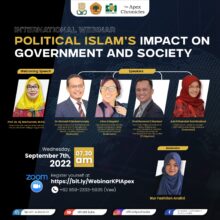Right Wing Extremism in Indonesia and Malaysia

Right-Wing Extremism is usually defined as a specific ideology characterized by anti-democrat opposition to equality. It is linked to racism, xenophobia, exclusive nationalism, conspiracy theories, and authoritarianism. These traits produce a set of “enemies”, which are seen as a threat to the survival of a nation, culture or race. The most common enemies and targets of violence are immigrants, ethnicities, and religions, anti-racist/fascist and left-wing politicization and widespread contempt for LGBTQ.
There are several extreme right-wing parties and organizations in Europe and beyond, although most of them are not very successful, but arguably neo Nazism and Neo Fascism are two of the most well-known forms of right-wing extremism. Right Wing Extremism is often associated with behavioral characteristics, such as motivated violence. Some scholars also argue that counter-jihadi movements such as ISIS (Islamic State of Iraq and Shia) are one of the extreme right-wing groups.
Historically, the concept of right-wing extremism emerged from fascism in the post-war period. Initially this phenomenon used the word “right-wing radicalism” as a general term for parties and movements on the far-right political spectrum, both those with and without clear ties to the expression of the war between Fascism and the Nazis. During the 1970s and 1980s, “right-wing radicalism” was largely replaced by “right wings extremism”.
In the 1990s, it became the dominant concept, especially in Europe continental. In other contexts, especially North America, the concept of “white supremacy” is more widely used, and contains a bright racist belief that the white race is superior, and therefore must be dominant over other people and races.
In recent years, scholars have often referred to “right-wing radicalism” and “right-wing extremism”, as concepts most often used to distinguish between ideologies that are democratic, but not liberal (radicalism) on the one hand and anti-democratsi (extremisme) on the other side. In another words, radical rights are behaviors against the liberal aspects of democracy (suchas minority rights) and do not promote the use of force, while extreme rights are inherently anti-democratic behaviors and in some cases legitimize the use of violence in pursuit of its political goals.
Malaysia and Indonesia under threat of right-wing extremism
Right-wing violence continues to be a significant problem for many countries around the world. Since 2000 there have been at least ten deadly and violent of the right extremism that occur annually in Western Europe, and in US the level of deadly right-wing violence even higher.
And in countries like India and Myanmar there are many examples of anti-Muslim violence. Especially if we include non-physical violence (e.g. hate speech) orviolent immersion, this form of right-wing extremism becomes increasingly widespread. In the Asian context, Right Wing Extremism is also a big problem.
Quoting from an article written by Choong Pui Yee a Research Analyst at the S. Rajaratnam School of International Studies (RSIS), Nanyang Technological University, Singapore, in his article he explained that in Malaysia along with the widespread influence of civil society, there has also been an increase in the number of votes from sometimes evil extremist groups, namely Malay right-wing non-governmental organizations.
Although some may regard Malay right-wing groups as fringe voices, and there are strong arguments of such groups as representations of freedom of expression, the time has come for the government to take a stand and try to control the voices of Malay right-wing groups that diverge and lead to suchextremism. Because freedom of expression does not mean freedom to slander, and if the government does not pursue an action and instead normalizes the extremist narratives will causeMalaysian society fragility.
Right-wing extremism, which scholars also exemplify as counter-jihadist movements such as ISIS (Islamic State of Iraq and Shia), brings great problems to several countries in Asiasuch as Malaysia, and Indonesia. After the group has beendeclared defeated or fallen, the ideology that merïvecarried as an extremist militant group remains alive and influential in various countries.
Dr. Ahmad El-Muhammady an Asisstant Professor at ISTAC-IIUM explained that a movement of ISIS has fallen and been eliminated as in the Shia country, Iran and even throughout the world there is no longer a central organization of ISIS, nor in Malaysia or outside Malaysia. However, the ideology is still alive both in the digital space and in the understanding of some people.
In Malaysia, there are some people who still believe in the ideology of ISIS. Not only do they believe it, they are also disseminating and talking about the ISIS ideology. Usually the ideology is disseminated by people who have gone to Syria and returned to Malaysia (Returnees).
Ahmad El Muhammady – Assistant Professor at ISTAC-IIUM
ISIS became a new force ready to launch fierce resistance to the ruling regime and was deemed incapable of carrying out the mission of forming an Islamic state. Ironically they legitimize the use of violence to oppress minorities and attack regimes that are out of line. ISIS emerged as a real political force with a clear ideology and territories occupied by violent means.
“The ideology carried by ISIS, if we analyze it, is an ideology oriented towards religious narratives or discourses about religion and also political narratives. In the Malaysian context besides the religious narrative, ISIS also carries a narrative of political radicalization,” said Ahmad El Muhammady.
He continued, it means that society or people can become radicalized through political issues, and these issues are combined with religious issues, so that they can become radical extremists. “Theyalways talk about political issues and religious issues, so the merging of the two narratives is very dangerous for national harmony, and order,” he said.
According to Ahmad El Muhammady, the trend of the pattern of spreading narratives by extremism groups in Malaysia is always influenced by the situation that occurs and the influence of groups outside Malaysia. He gave an example, during a pandemic or during a lockdown due to coronavirus people can become radicalized because of the emergence of gerakan or group Antivaccination. They echoed that the community should prepare for The Army of Mahdi, in this situation a group called “The Last Dream Journey (Perjalanan Mimpi yang Terakhir – PMYT)”, led by Sittah An-Nur emerged. This is another form or other way to spread extremist narratives in addition to the radical narratives and political narratives that have been frequently used.
In addition, extremists who come from outside Malaysia also have agreat influence on the development of extremist ideology in the country, religious political narratives such as “Old Hindus” who are Hindu extremists, who come from outside Malaysia but enter Malaysia through certain alliances within certain communities in Malaysia, have a harmful impact on Malaysia’s public order and national harmony.
The ideological arena, stories or narratives they carry are inconsistent with the values upheld in the Malaysian state, and are also harmful to the Hindu community in Malaysia becausethe Hindu Community generally in Malaysia is not as extreme as the “Old Hindu” and exposure of the “Old Hindu” This puts them in a dangerous state.
Not much different, the fall of ISIS the influence of the narrative carried by the pro-ISIS group is also still alive in Indonesiatoday. Although according to Dyah Ayu Kartika Analyst from The Intitute for Policy Analysis of Conflict (IPAC) the narrative spread by ISIS so far from its observations has not changed much.
“Most of them only use old narratives, old issues about how people should be religious, narratives about the end times remain, and the problem of jihad also remains, so the narrative is the same,” Dyah said.
According to Dyah, their activity is starting to decrease. “What is probably a bit more recent that we have observed in Indonesia itself is also about the development of those in Shia, who are in the al-khuld and amruj camps,” she continued.
So there are some of the women detained in thecamps who are actively updating their conditions there. It has the aim of awakening the ghiroh or spirit of the Brotherhood and akhwat or followers of ISIS in Indonesia. To be sure that even though their lives were not so good there, stilli they were still Istiqomah on the promised path, which they also believed in.
There are also narratives about the roles performed or activities carried out by ISIS cells in other countries, for example in Africa. In Filipina, there are those who try to maintain the spirit of the brotherhoods or akhwat-akhwat followers of ISIS, that ISIS still exists.
At that time there were cases of prison break-ins, every time there were these efforts, they were always lorified, so as to maintain the spirit of those who still support ISIS to remain loyal to ISIS.
Dyah Ayu Kartika – Analyst from IPAC
Taufiqurahman, a researcher from PAKAR (Center for the Study of Radicalism and Deradicalization) confirmed that the narrative spread by pro-ISIS groups to date has not changed. For example, the narrative of the obligation of Muslims to uphold the Caliphate, to uphold Islamic Sharia wherever it is. There is also an invitation to emigrate to Afghanistan following the collapse of ISIS in Syria and the narrative that the glory of islam will emerge from Khurasan.
“It was spread by ISIS supporters on facebook, telegram and WhatsApp groups,” he said.
Just like in Malaysia, the trend of narrative dissemination patterns by extremism groups is always influenced by the situation that occurs also applies in Indonesia. Toward political party, conflict seeds such as SARA (Ethnicity, Religion, Race and Intergroup) and political identity usually begin to be played out to shake the stability of the nation.
The extreme groups is always looking for opportunities to re-promote the caliphate system and try to bring down people’s trust in the government.
Taufiqurrahman – Senior Researcher from PAKAR
However, Dyah Ayu sees that so far the extremism organizations have not shown any actions that lead to efforts to destroy the stability of the nation, but in terms of individuals have begun to see opinions related to dislike or hatred towards the government conveyed through social media.
According to her, the spread of this narrative was not spread by a certain organization, in contrast to antiquity which can be seen the existence of the media center to publish such narratives. Currently, such efforts are carried out individually. What Dyah means is that the expression of opinions of dislike or hatred spread on social media is mostly done individually. But if this is related to ISIS or Jemaah Islamiyah, there is something interesting about JI that it is currently at the stage of the importance of proselytizing as much as possible in order to create a state based on Islam.
The efforts made include through the media by creating their own media. The organization once created a media that conducted, observed and also legitimized the Government. Dyah pointed out, that JI once had a special division that focused on media issues, observing and then producing media with news related to politics.
ISIS and Propaganda Strategy
Since its emergence, ISIS’s propaganda strategy has been widely carried out through social media to attract the attention of young people. Such as making professionally packaged movie footage videos in the style of Hollywood action movies, or uploading videos of the murder of their hostages, and so on. The internet and social media became effective media to spread their ideology.
In Malaysia El- Muhammady explained that demographically, young people with an age range between 20 to 40 years, are social media users who often access information instantly so they are the ones who have great potential to be exposed. In addition, people who are in urban areas or rural areas they also have great potential to be exposed because internet and technology penetration can affect people anywhere both in the city and outside the city.
And it is also a person who comes from a highly educated group as well as a poorly educated person, because it is not about the level of education but about exposure to information.
“Sosial media is the most influential platform in radicalization, until there is a nickname of online radicalization. Social media is not only Facebook, twitter or youtube, but includes Telegram, WA and also includes R e ddit, because Reddit is also a medium to share information, everyone can join, can read the information shared,” said Ahmad El-Muhammady.
Isis propaganda in Malaysia and also in Indonesia spread through social media has something in common. The narratives are spread through facebook, whatsApp and telegram.
“Most of it is through Facebook if the narrative is still general, meaning that narratives related to the obligation to uphold the caliphate and Islamic Sharia are usually spread through Facebook, but if the narrative of the obligation to make up for Amir Khilafah or Amir Daulah is usually started to be spread through telegram groups or special WhatsApp groups,” explained Taufiqurahman.
These groups in the form of telegram and whatsapp are closed and people in the group are more careful to network the people who will join. “There is a change in pattern, if in the past in early 2014 or 2015 you could still join public telegram groups or Whatsapp groups because of their public nature, now it is a bit difficult,” said Dyah.
This propaganda strategy is considered successful, because since 2017 there have been dozens of Indonesian citizens who have emigrated to Afghanistan to join ISIS in Khurasan province and one of the most famous figures is Saifullah, an ISIS supporter from West Sumatra. Until now, there have also been efforts by several Indonesian citizens who want to join ISIS in Khurasan. (Asy Syifa Salsabila and Seto Ahmad contribute to this story)



